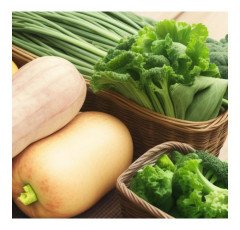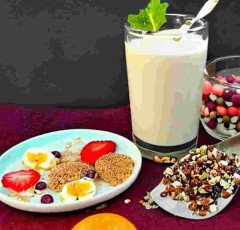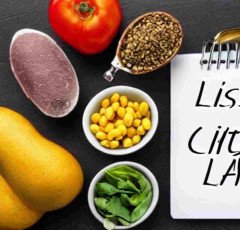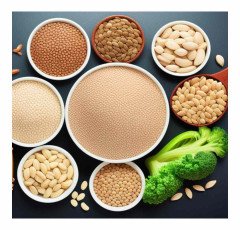The appeal of organic food has grown due to its possible environmental and health benefits. Here are some potential advantages of eating organic food, while opinions may differ and scientific agreement is still being reached:
Reduced Chemical Exposure
Synthetic pesticides, herbicides, and fertilizers are often avoided or used at a lower level in organic farming. As a result, organic produce may contain fewer chemical residues than its conventionally grown equivalents, potentially lowering the risk of pesticide exposure.
Nutrient Content, According to certain research, fruits and vegetables that are grown organically may contain more antioxidants and specific vitamins. The variations, though, can be slight and may rely on a number of variables, such as the type of crop and the soil.
No GMOs, Because genetically modified organisms (GMOs) are frequently prohibited under organic laws, it is less probable that GMO elements will be found in organic meals.Support for Sustainable Agriculture, Generally speaking, organic agricultural techniques encourage soil health, biodiversity, and more environmentally friendly land management. This can lessen the detrimental effects of conventional farming on ecosystems and help the environment remain sustainable over time.Animal Welfare, When producing organic animal products (meat, dairy, and eggs), tighter animal welfare guidelines are frequently followed, including limiting the use of antibiotics and growth hormones and allowing animals access to outdoor spaces.Reduced Antibiotic Use, In organic farming, the use of antibiotics on animals is often limited, which can help prevent the emergence of germs that are resistant to antibiotics.Some claim that organic goods, particularly fruits and vegetables, have better flavors and tastes. This may be the result of things like slower growth, more nutrition intake from natural sources, and a lack of artificial additives.
Individual responses to organic food can differ, and additional research is necessary to completely comprehend the scope of these advantages.
Additionally, some people may be constrained by the cost and availability of organic food. It's important to balance these advantages against the total dietary and lifestyle choices that support sustainability and health when evaluating the advantages of organic food.
Environmental Impact, Conservation and minimizing harmful environmental consequences are frequently the focus of organic farming practices. Crop rotation, cover crops, fewer synthetic inputs, and biodiversity promotion are a few examples of these techniques. Organic food production supports these methods in an effort to improve ecosystem health and maybe lessen agriculture's overall environmental impact.
Support for Local Economies, Because many organic farms are smaller and more regional, they can assist strengthen local economies and support local job growth. Supporting the neighborhood food system by buying organic food at farmers' markets or directly from regional suppliers.Preservation of Soil Quality, Using organic farming practices, such composting and refraining from synthetic chemicals, over time can increase soil health. Sustainable agriculture depends on healthy soils, which can also help with carbon sequestration and potentially lessen the consequences of climate change.Preservatives, synthetic additives, and artificial colors and tastes are frequently avoided in organic processed foods (such as organic snacks or packaged goods). For those who choose a diet low in processed foods and potentially dangerous substances, this may be advantageous.Concerns about allergens, Depending on the particular product and manufacturing techniques, some people with allergies or sensitivities may find that organic foods are less likely to contain specific allergens or traces of them.
Remember that organic food, like any dietary choice, should be a part of a balanced and varied diet.
The consumption of a range of fruits, vegetables, whole grains, lean proteins, and healthy fats are just a few of the potential advantages; it's also important to concentrate on general good eating habits. As the field of organic food and sustainable agriculture develops, it's also a good idea to keep up with the most recent findings and advice in these areas.
Numerous people prefer organic food in order to live ethically and in accordance with their principles. Supporting organic farming can be considered as a method to advance moral and sustainable lifestyles and to foster a sense of community among people who share the same values and give priority to health and the environment.
Reduced Exposure to Antibiotics and Growth Hormones, Organic animal products, such as meat and dairy, frequently come from animals that do not regularly get antibiotics or growth hormones. Through the food chain, this can lower the danger of eating these drugs.
Potential Long-Term Health Effects, Although more research is required, some studies indicate that long-term use of organic foods may benefit particular health outcomes, such as a decreased risk of specific cancers or better general health. The research is not yet conclusive, thus it is important to take into account a variety of factors that affect health.Avoiding Synthetic Food Additives, Foods that are processed or organic have a lower likelihood of containing synthetic additives such artificial sweeteners, colors, or flavors. For reasons linked to flavor, potential health risks, or personal preferences, some people favor this element of organic food.Promotion of Biodiversity, Crop rotation and diversified planting are frequently encouraged by organic agricultural practices. By fostering habitats for varied species and reducing reliance on monoculture, which can be more vulnerable to pests and diseases, this strategy can aid in the preservation of biodiversity.
To underline that a person's preferences, dietary demands, and beliefs may affect the advantages of eating organic food.
For a variety of reasons, including their health, the environment, and morals, people select organic foods. It's beneficial to evaluate these aspects of organic food in the context of your entire priorities and way of life. Additionally, keeping up with the most recent findings in organic food research, laws, and certifications will help you make well-informed decisions that are in line with your values and objectives.
Possible Decrease in Pesticide Residues, Organic farming methods frequently try to reduce the use of synthetic pesticides, which may result in reduced pesticide residues in organic products when compared to equivalents grown conventionally. This can be crucial for people who want to limit their exposure to these toxins.
Support for Sustainable Fishing, The extension of organic certification to seafood can help to advance sustainable fishing methods. Products made from organic seafood often follow rules that emphasize ethical fishing, protecting natural habitats, and reducing environmental effect.Consumer Power, The demand for organic goods promotes the expansion of organic farming and may persuade the larger food industry to adopt more ecologically friendly and sustainable practices. Customers can positively influence the market and encourage the adoption of healthier and more moral food production practices by purchasing organic.Education and knowledge, The growing demand for organic food has raised public knowledge of sustainable agriculture techniques, food production methods, and farming methods in general. This raised understanding may enable people to make wiser food decisions and contribute to a more wholesome food system.Research and Innovation, The popularity of organic farming has stimulated more research and development in the area of sustainable agriculture. There is potential for the development of new technology and approaches that help both conventional and organic farming as organic practices receive more attention.less Soil Erosion, Soil conservation methods used in organic farming, like cover crops and less tillage, can help stop soil erosion. To preserve soil fertility and stop nutrient flow into waterways, this is essential.To be aware that personal viewpoints, regional customs, and product preferences can all influence the advantages of organic food. While there are a number of possible benefits, it's also critical to recognize that organic farming has drawbacks, such as increased production costs, the possibility of output variances, and the need for ongoing innovation to overcome these drawbacks.
It's beneficial to assess your own values, health objectives, and environmental concerns in the context of the available data and the larger food system while thinking about the advantages of organic food.
Responsible Water Management, An important component of organic farming is the promotion of water-wise behaviors. This is crucial in areas where water shortage is an issue since wise water management promotes sustainability over the long run.
Improved Soil Health, Organic agricultural practices including composting, cover crops, and lessening chemical use can gradually enhance soil structure and fertility. A healthy environment benefits from soils that are better able to hold onto moisture, support plant growth, and do so.Support for Local Food Systems, A lot of organic products come from nearby suppliers, which helps boost regional economies and lessen the carbon footprint of long-distance shipping. The encouragement of seasonal eating and the strengthening of ties between customers and producers are two benefits of this assistance for local food systems.Promotion of Non-GMO Practices, Genetically modified organisms (GMOs) are generally not allowed in organic farming. Those who are worried about GMOs have a clear option to stay away from genetically modified components by buying organic products.Organic animal products, such meat and dairy, are frequently produced without the use of synthetic growth hormones, reducing the risk of exposure to these hormones. This may be especially important for people who want to limit their exposure to these hormones.Education and advocacy, The organic movement has sparked campaigns to promote awareness of sustainable agriculture, biodiversity, and the value of supporting regional farmers. This raised awareness may result in beneficial adjustments in consumer behavior and broaden support for farming methods that are more environmentally friendly.Long-Term Sustainability, By encouraging organic farming methods, consumers and producers promote a more sustainable food system, which is essential for assuring a consistent supply of food for present and future generations while reducing harmful environmental effects.
Should accept that there is still more study to be done on the advantages of organic food, and that personal experiences can differ.
Additionally, a number of factors may affect the accessibility and pricing of organic options. While buying organic food has a number of potential benefits, it's important to make educated choices based on a combination of individual tastes, empirical data, and a comprehensive grasp of the food chain.
Reduced Exposure to Antibiotic-Resistant Bacteria, Using fewer antibiotics regularly in organic livestock production can help reduce the growth of antibiotic-resistant bacteria, a serious public health threat.
Support for Pollinator Health, By avoiding synthetic pesticides, organic farming techniques help provide healthier conditions for pollinators like bees and butterflies. This is essential for preserving biodiversity and making sure that many food crops get pollinated.Climate Resilience, Some organic farming techniques, such as agroecological practices, place an emphasis on diversified planting, cover crops, and soil health, which can improve a farm's capacity to resist extreme weather events and so contribute to climate resilience.Impact on Rural areas, By boosting local economies, generating jobs, and developing a sense of community through farmer's markets and other local food programs, the rise of organic farming can have good socioeconomic effects on rural areas.Ethical Concerns, Some people select organic food because they have ethical concerns about the treatment of farmworkers, the welfare of animals, and the support of agricultural practices that are consistent with their values.
Genetic diversity in the food supply is important for adaptation to shifting environmental circumstances and pests, and organic farming's emphasis on diversified planting and the preservation of heirloom varieties can assist sustain this genetic diversity.
Use of Synthetic Fertilizers Reduced, Organic farming focuses on natural fertilizers like compost and manure rather than synthetic fertilizers, which can help lessen the amount of nutrients that run off into water bodies and the resulting environmental issues.
Global Food Security, Because organic farming relies on local resources and emphasizes self-sufficiency, it may help to promote food security in areas with limited access to synthetic inputs.Contribution to Sustainable Food Production Goals, Organic farming supports numerous sustainable development objectives relating to the preservation of the environment, biodiversity, and the development of robust food systems.Consumer Decisions and Market Influence, When consumers choose organic goods, they are sending a strong message to the market that will help the organic industry expand and persuade conventional producers to use more environmentally friendly production methods.
While there are a number of possible advantages to eating organic food, it's important to weigh these against your individual circumstances, dietary requirements, and local availability. Maintaining a varied and healthy diet, whether or not it is totally organic, should be the major focus for general health and well-being because balance is important.

























































































 Men Clothing
Men Clothing  1150+Trendy kids coloring pages Bundle
1150+Trendy kids coloring pages Bundle  The Click Engine
The Click Engine  Hot Bags For Pain Relief
Hot Bags For Pain Relief  BEST SELLER TOP10
BEST SELLER TOP10  NordPass
NordPass  ASUS Laptop
ASUS Laptop  One World Collection
One World Collection  Sennheiser
Sennheiser  Smart Doorbell
Smart Doorbell  SEO Checklist
SEO Checklist  Unlimited access to classes on illustration, photography, design, film, music
Unlimited access to classes on illustration, photography, design, film, music  Creative Brief For Video Shoot
Creative Brief For Video Shoot  RPM 3.0
RPM 3.0  SOFAS
SOFAS  ASPINAL LONDON
ASPINAL LONDON  NordLocker
NordLocker  ELECTRONIC ACCESSORIES
ELECTRONIC ACCESSORIES  Women Fashion
Women Fashion  Amazon Best Selling Products
Amazon Best Selling Products  Online Marketing
Online Marketing  NordVPN
NordVPN  Unreal Engine 5 For Beginners Learn The Basics Of Virtual Production
Unreal Engine 5 For Beginners Learn The Basics Of Virtual Production  Graphics & Design
Graphics & Design  Best Home Appliances
Best Home Appliances  Online Technology Classes
Online Technology Classes  Best Selling Books
Best Selling Books  All Wireless Products
All Wireless Products  Acer Laptop
Acer Laptop  Only For The United States
Only For The United States  Best Sellers On Amazon
Best Sellers On Amazon  TitTok Revolution
TitTok Revolution  Favorite Company (Cuelinks)
Favorite Company (Cuelinks)  The Secret Email System
The Secret Email System  Best Robotic Vacuum Cleaners
Best Robotic Vacuum Cleaners  Top Rated From Amazon
Top Rated From Amazon  Artificial Intelligence
Artificial Intelligence  Hello Theme
Hello Theme 
















